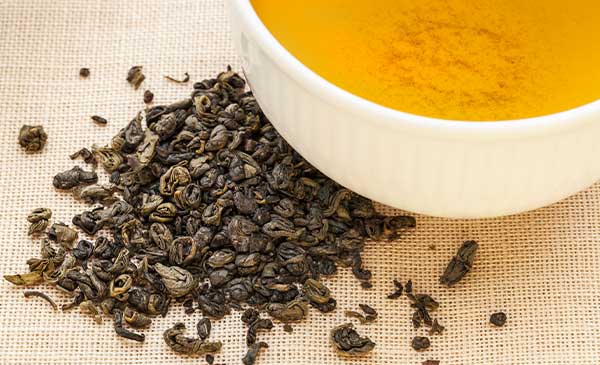What Does Gunpowder Tea Taste Like?

When you first hear the name Gunpowder tea, you might imagine something explosive or fiery. But despite its dramatic name, Gunpowder tea is actually a green tea with a flavor profile unlike any other.
This tea has earned its reputation for its tightly rolled leaves, resembling tiny pellets of gunpowder. The rolling process not only preserves freshness but also creates a bold, slightly smoky taste. A tea that has captivated tea drinkers for centuries.
So what does Gunpowder tea really taste like? The answer lies in its appearance, processing method, and brewing style. Let’s explore its flavor profile and tasting notes. You'll learn why this unique tea continues to intrigue tea enthusiasts around the globe.
The First Impression: Aroma and Appearance
Before you even take a sip, Gunpowder green tea begins telling its story through its aroma. When dry, the leaves give off a grassy, slightly smoky scent. Once steeped, the aroma opens up into a fuller fragrance. The aroma releases hints of earthiness, toasted notes, and a touch of mineral sharpness.
The appearance is equally striking. Unlike other fluffy loose tea leaves, Gunpowder tea is made of small, tightly rolled pellets. This technique protects the oils and freshness of the tea. When hot water hits these pearls, they slowly unfurl, releasing their distinctive character.

What Does Gunpowder Tea Taste Like?
The taste of Gunpowder tea is often described as bold, slightly smoky and astringent. Layers of flavor develop over multiple sips. Unlike lighter green teas such as Dragonwell or Sencha, Gunpowder tea delivers a robust, full-bodied flavor. It can stand on its own or be blended with herbs like mint.
Here are the main tasting notes:
- Smokiness: Gunpowder tea has a slightly smoky flavor, which comes from the way the leaves are pan-fired during processing. This smokiness is subtle, not overpowering, but it sets Gunpowder apart from other green teas. The rolling and firing process gives the leaves a dense, toasted quality, locking in their flavors.
The smokiness of Gunpowder tea is often characterized as a hint or a mild smoky taste. It is much more subtle than Lapsang Souchong which offers a strong, bold, and unmistakably smoky flavor profile.
- Earthiness: Alongside the smoke, you’ll notice earthy undertones with a grounding, natural character.
- Vegetal Notes: Like most green teas, Gunpowder has a vegetal side giving it a savory quality.
- Astringency: Gunpowder tea can be slightly astringent, leaving a dry sensation in the mouth. This becomes more pronounced if the tea is steeped too long or in water that’s too hot.
- Nutty/Toasty Finish: Many tea drinkers note a nutty or toasted aftertaste, which lingers pleasantly on the palate.

Comparing Gunpowder Tea to Other Teas
Gunpowder tea’s boldness often surprises first-time drinkers, especially if they’re used to softer green teas. Compared to lighter greens like Dragonwell or Sencha, this rolled Chinese tea is smokier, bolder, and closer in body to roasted oolong or even black tea.
Brewing Gunpowder Tea for the Best Taste
Using the right brewing techniques is essential to revealing the rich flavor of this strong tea while avoiding bitterness.
Steep one teaspoon per 8 ounces of water in 175–185°F water for 2–3 minutes. Longer steeping will increase smokiness and astringency. Since the pellets expand significantly, a little goes a long way.
Reusing the leaves for multiple infusions reveals new layers of flavor from smoky to sweet.
The Mouthfeel and Aftertaste
Beyond taste, Gunpowder tea has a distinctive mouthfeel. The first sip often feels brisk and lively, with a slightly dry, astringent edge. As the cup cools, you’ll notice a smoother, more toasty character.
The aftertaste lingers, leaving a smoky-nutty finish that invites another sip. This persistence is one of the reasons many tea drinkers return to Gunpowder time and again. It’s not just about the taste, but the experience it leaves behind.
Pairing Gunpowder Tea with Food
Its smoky, full-bodied flavor pairs well with grilled dishes, savory meals, and even sweet pastries that balance its astringency.
Acquired Taste or Instant Favorite?
Some tea drinkers fall in love with Gunpowder tea immediately. Others find the slight smokiness an acquired taste. If you’re new to green teas, you may want to start with a lighter variety before trying Gunpowder. But for those who enjoy bold, adventurous flavors, Gunpowder tea is often an instant favorite.
Final Thoughts: A Tea with Character
So, what does Gunpowder tea taste like? In short, it’s smoky, earthy, and bold, with a lively astringency and a toasty finish. It’s a tea with character—one that tells a story of tradition, trade, and craftsmanship.
Whether you enjoy it plain, blended with mint, or paired with food, Gunpowder tea is a unique experience worth savoring. If you’re looking for a green tea that stands apart from the rest, Gunpowder is the perfect choice.






